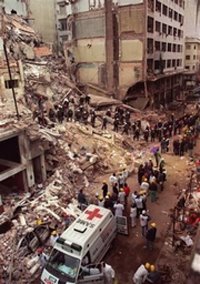Argentina says Iran interferes in bombing investigations
The South American country had issued warrants to arrest former top Iranian officials acussed of plotting the bombing of a Buenos Aires Jewish center in 1994. Tehran rejected allegations as Washington offers help to capture the Iranian leaders.

Iran issued warrants to arrest an Argentine judge and a prosecutor who had asked for the international capture of Iran’s former President Ali Rafsahjani and other seven top officials of the Islamic Republic acussed by Argentine courts of being behind the bombing of a Buenos Aires Jewish center in 1994.
Tehran says the evidence presented by Argentine authorities is baseless and produced by the intelligence agencies of Israel and the United States, as Buenos Aires replied stating that Iran's complaint "prejudges the content of the ongoing judicial actions and includes statements that are an interference in Argentine internal affairs."
As diplomatic tension between both nations grows bigger, the US State Department, which had congratulated Argentina for demanding the arrest of the Iranian officials, offered help to Buenos Aires to capture them.
In a White House statement read out by press secretary Tony Snow on the weekend, Bush described Iran and Hezbollah as a “global nexus of terrorism”. He added: “We applaud Argentina’s justice system for its tenacious pursuit of justice against the perpetrators of this terrible attack, and stand ready to support the Argentine prosecution in any way we can.”
Meanwhile, Argentine muslims held pro-Iranian demonstrations in Buenos Aires demonstrators issued a statement addressed to Judge Rodolfo Canicoba Corral saying his verdict was based on falsified evidence. The document describes Corral's decision as an "insult" to the Argentine Muslim community, as well as says that the warrants were the result of the Argentine judiciary's caving in to pressure from the international Zionist lobby.
On Monday, Luis D'Elia, a controversial undersecretary for land and habitat and an outspoken member of Kirchner's cabinet, visited the Iranian diplomatic mission in Buenos Aires to deliver a letter that criticized the judge on the case. Hours later it became known that President Kirchner asked Mr. D’Elia to resign.
In the 1994 attack, a truck with explosives leveled the seven-floor Argentine Israeli Mutual Association building, a symbol of the country's Jewish community - Latin America's largest. Argentine, Israeli and U.S. officials have long blamed the bombing on Hezbollah guerrillas backed by Iran. In court documents, Argentine prosecutors say the attack could have been tied to Argentina's decision to stop providing Iran with nuclear technology and materials.
Hernan Etchaleco
Pravda.ru
Subscribe to Pravda.Ru Telegram channel, Facebook, RSS!





